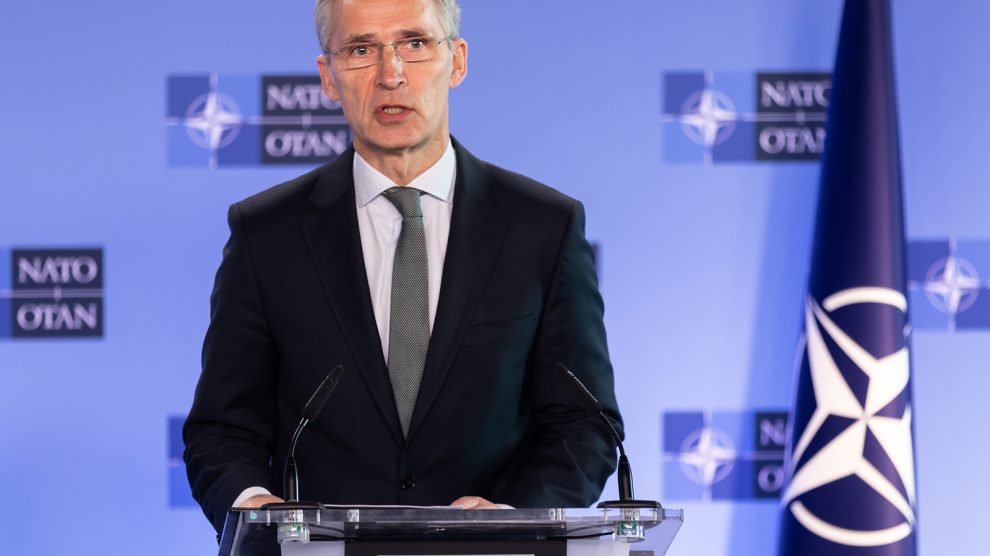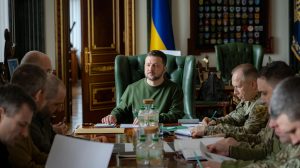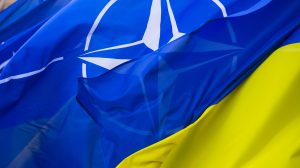You can read all of our coverage of Russia’s invasion of Ukraine, including explainers and articles offering context and background information here.
Russia’s invasion of Ukraine
The NATO secretary general this week urged members of the transatlantic military alliance to ramp up ammunition production for Ukraine as he warned Vladimir Putin was preparing for new offensives and attacks.
“We see no signs that President Putin is preparing for peace. What we see is the opposite, he is preparing for more war, for new offensives and new attacks,” said Jens Stoltenberg (pictured above) on Tuesday.
As Nato defence ministers in Brussels, Stoltenberg said the question of supplying fighter jets to Ukraine was on the agenda but “not the most urgent issue now”.
Instead, he said, “the urgent issue right now is to deliver what has always been promised”, namely armoured vehicles, including German Marders and US Bradleys, Leopard battle tanks and others.
Ukraine’s army chief said Russia fired 36 cruise missiles early on Thursday, a day after six balloons were spotted over the capital Kyiv.
The missiles fired from land and sea killed a woman and hit critical infrastructure, officials said. Ukraine noted there had been a change in Russian tactics, in an apparent reference to the balloons above Kyiv.
Most of the balloons were shot down, Kyiv’s military said, adding that they were being propelled by wind power. The Ukrainian military said the balloons had reflectors, which would entice Ukrainian aircraft defences to lock on to them.
Earlier in the week, Romania briefly scrambled military jets and neighbouring Moldova temporarily closed its air space after authorities in both countries reported mysterious weather balloon-like objects traversing their skies.
Romania’s defence ministry said it deployed two jets that are under NATO command to its southeastern skies to seek an aerial object it described as being small with “characteristics similar to a weather balloon.” It had been detected initially by radar systems in Romanian airspace at an altitude of about 11,000 meters.
On Thursday, President Alexander Lukashenko warned Belarus is ready to fight alongside Russia in Ukraine if his country is attacked.
“I am ready to fight with the Russians from the territory of Belarus in only one case: If even one soldier comes onto the territory of Belarus to kill my people,” the state-run Belta news agency quoted Lukashenko as telling a news conference.
“If they commit aggression against Belarus, the response will be the most severe, and the war will take on a completely different nature,” he added. Russia’s military used Belarusian territory as a launchpad for the invasion of Ukraine last February.
Russia’s system for supervising thousands of Ukrainian children uprooted during the war involves “re-education” camps and forced adoptions, US researchers said this week, calling it a sprawling operation directed by the Kremlin’s highest levels.
According to a report from the Conflict Observatory, a State Department-supported initiative, Russia has placed at least 6,000 Ukrainian children at 43 camps and institutions stretching from Ukraine’s Russian-occupied Crimea region to Siberia and Russia’s Pacific coast, or with new families, as part of its “systematic, whole-of-government approach to the relocation, re-education and, in some cases, adoption and forced adoption of Ukrainian children.”

Other news
Moldova’s new government led by pro-Western economist Dorin Recean was sworn in on Thursday after winning parliament’s approval, as the country signalled a shift to security concerns amid Russia’s war in neighbouring Ukraine. Recean, a 48-year-old economist who served for a year as President Maia Sandu’s defense and security adviser, was tapped by her last week as prime minister-designate after Natalia Gavrilița suddenly quit the position.
Humanitarian aid sent by Armenia for victims of last week’s devastating earthquake in Turkey could boost the neighbouring countries’ efforts to normalise their relations, Turkish Foreign Minister Mevlut Cavusoglu said on Wednesday. A border gate between the long-feuding neighbours was opened for the first time in 35 years to allow aid for quake victims in southern Turkey. Armenia also sent a rescue team to Turkey to help in the search for survivors.
Hungary’s European Commissioner Olivér Várhelyi is facing calls to resign after a microphone in the Parliament caught him mumbling under his breath that MEPs are “idiots,” during a question-and-answer session Tuesday with lawmakers on the Western Balkans. “How many other idiots are still there?” Várhelyi, who is in charge of countries’ bids to join the EU, could be heard saying on the hot mic. Várhelyi already has a reputation for being rude and aggressive to staffers, and MEPs last month called for the Commission to investigate him over his stance on Serbian nationalists.
Pawel Herczynski, EU ambassador to Georgia, has given assurances that Brussels will deliver a “merit-based” assessment on Georgia’s membership bid this fall amid claims by Tbilisi officials that Georgia was unfairly rejected last year. Yet he implied that Tbilisi’s many domestic political woes may still influence the positions of individual member states whose consensus will be needed for the bloc’s final decision on granting Georgia the much-awaited candidate status.
Albanian opposition lawmakers blowing whistles disrupted a parliament session on Monday to press home their demand for the government’s resignation for alleged corruption, as hundreds of their supporters outside tried to push into the building. Police kept out the demonstrators, who threw smoke bombs and fireworks before dispersing. No arrests or injuries were reported. The tension followed a similar protest on Saturday in which thousands of opposition supporters took part.
Warsaw’s mayor, Rafał Trzaskowski, has unveiled plans to more than double the size of the Polish capital’s metro system by 2050. The current two lines (with a third already planned) would be expanded to five; the number of stations would rise from 39 to 103; and the length of track would extend from 42 to 113 kilometres. The expansion will ensure that the metro system reaches 17 of the city’s 18 districts, says Trazaskowski, and that over half of Varsovians will live within one kilometre of a station, up from 28% currently. For many residents, it would halve travel time to the city centre.
Polish state-run utility Enea and investor PKO TFI, part of the biggest local lender, PKO Bank Polski, have signed a letter of intent to set up a joint fund dedicated to investments in renewable energy projects, the companies said on Monday. Their future closed-end investment fund, to be called PKO Energia Odnawialna, will buy shares in companies that develop renewable energy facilities and make profits from the production and sale of electricity or heat. The facility will also invest funds from payments for certificates made by investors.
A Russian airports operator has bought a stake in running an airport in northwestern Kazakhstan close to the Russo-Kazakh border. With its first foreign acquisition, Russia’s Airports of Regions company is hoping to develop the Oral airport as a regional hub, most likely to serve travelers affected by the shortage of flights out of Russia owing to its war in Ukraine. The firm, owned by sanctioned Russian billionaire Viktor Vekselberg, did not specify the price or size of the stake when it announced the acquisition on February 10.
Unlike many news and information platforms, Emerging Europe is free to read, and always will be. There is no paywall here. We are independent, not affiliated with nor representing any political party or business organisation. We want the very best for emerging Europe, nothing more, nothing less. Your support will help us continue to spread the word about this amazing region.
You can contribute here. Thank you.







Add Comment